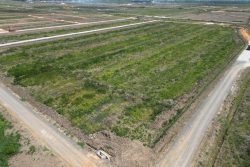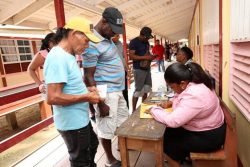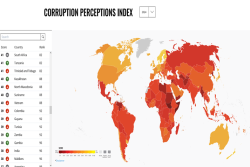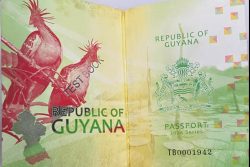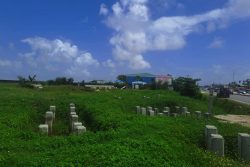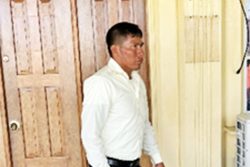As arid El Nino conditions continue, the Ministry of Agriculture announced yesterday that government has spent in excess of $250M since the phenomenon began and with reduced water levels, pumps in several regions have been activated on a 20-hour-basis costing $3.2M daily.
In a statement, the Ministry said that in light of the prevailing El Nino weather conditions, it has provided financing to several regions for support in fulfilling farmers’ irrigation needs. It said that significant sums of money are being spent to pump water into the East Demerara and Boerasirie conservancies and to operate irrigation pumps to maintain safe water levels to ensure the integrity of the dams. With reduced gravity flow for irrigation, 23 pumps have been put into operation on a 20 hours basis in Regions Two, Three, Four, Five and Six costing approximately $3.2M daily, the Ministry said.
The weather pattern is predicted to last until March.
The National Drainage and Irrigation Authority (NDIA) recently approved $4M for the Region Two Administration to purchase fuel for the continued operation of the Dawa and other irrigation pumps.
This sum was approved after representation was made to Agriculture Minister, Robert Persaud by regional authorities on behalf of farmers for additional irrigation.
The Ministry noted that in December that region benefitted from 6000 gallons of fuel in addition to $6M from the NDIA for the operation of irrigation pumps. To date, in excess of $11M has been spent to pump water in the region, it said. The NDIA along with farmers and regional officials are also examining the possibility of sourcing water from the western side of Lima Sands which is a catchment area for water, while work is currently ongoing to install a HDPE tube across the road “and a structure would be rehabilitated”.
The Ministry further said that Region Six and the Mahaica, Mahaicony and Abary areas also benefitted from $6M each for the same purpose.
This resulted from additional requests for irrigation water from farmers, it explained.
According to the statement, water is currently being sourced from the Canje Creek, Abary and Mahaicony rivers, especially when water levels are high with constant monitoring for salt content. It noted that the NDIA is looking at alternative sources to provide water for farmers.
In the Black Bush Polder area, the Water Users Association was also able to repair an irrigation pump at a cost of over $3M which is now providing a significant amount of irrigation water to the community.
Further, the NDIA has also excavated a number of canals both for irrigation of crops and provision of water to animals. The Ministry will continue to work with farmers and other stakeholders to undertake necessary interventions as these conditions prevail, the statement said.

